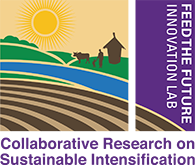Photo Credit: LaTrese Taylor
I remember vividly that a desire to travel and have a career in social programs was borne from my grandmother’s dreams, conversations with her, and the humble way in which she lived her life. Up until middle school, our household did not have a television, so listening to the radio led us into countless discussions on social topics in the United States and abroad. Our immediate family gave to churches, to other family members and friends, and of course, to organizations such as “Feed the Children”, which worked extensively in Africa.
Fast-forward thirty-five years. I am now a military retiree and reflecting on a family dynamic that brought an awareness of needs outside of my community and the United States, and making a transition into international development felt like the natural next step, only I didn’t know what that looked like until Peace Corps (PC) Senegal began their work with Kansas State University’s Sustainable Intensification and Innovation Lab (SIIL). In 2018, PC Senegal, SIIL and the Institut Sénégalais de Recherches Agricoles (ISRA) partnered together to demonstrate new agricultural technology and innovations in the fields of PC/Senegal’s Master Farmers. Under this program, Senegalese graduate student Khady Diome came to Keur Bakary, a small village in Senegal, to lead a research site. She worked on testing millet and fertilizer varieties as well as seed-spacing techniques in the fields of three local farmers.
In conferences and one-on-one discussions, what echoed in my head time and again is that there needs to be an intermediary with the ability to connect more research and pilot projects to government organizations and institutions, as well as smallholder farmers, without a long lead-time. With this trifecta partnership, we are building synergies that will be able to breach this paradigm and, in turn, Master Farmers like Chiekh Dieng can work with researchers to identify more readily technology that has been tailored to his community’s farming practices and challenges, but with “scaled up” benefits for the broader Senegalese farming system.
ISRA researcher Khadi Diome and Master Farmer Chiekh Dieng Photo Credit: LaTrese Taylor
As I prepare to wrap up my third year with Peace Corps Senegal, I plan to return to American University in Washington D.C. to pursue a Master’s Degree in International Development, with focus in West African Food Security, armed with the hands-on experience in working with researchers. Working with PC Senegal to manage this partnership also gave me a birds-eye view of what research-led youth development looks like in Senegal, and how research that incorporates nutrition-led agriculture, can fit into the greater system. In this particular scenario, my primary role was creating the linkage between the smallholder farmer and the researcher, and while it may have been a small role, it was still one with a potentially large impact in making these type of relations more customary in the future. This theme obviously warrants more discussion and work, and I plan continue working in the international development community to see how that unfolds and how I can contribute to its growth.
LaTrese Taylor
Food Security Peace Corps Volunteer Leader
Peace Corps Senegal 2016-2019


